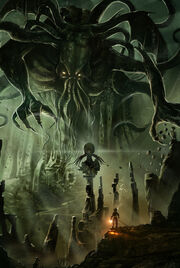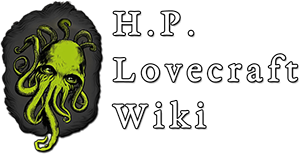No edit summary Tag: Visual edit |
No edit summary Tag: Visual edit |
||
| (6 intermediate revisions by 2 users not shown) | |||
| Line 1: | Line 1: | ||
| ⚫ | |||
| + | [[File:The Lovecraftian Horrors.jpg|thumb|The Lovecraftian Horrors]] |
||
| ⚫ | The '''Lovecraftian Horrors''', also known as '''Eldritch Abominations''' or simply '''Cosmic Horrors''', is a sub-genre of horror created by the American writer [[H.P. Lovecraft]] in his stories. Lovecraftian horror has been used in literature, art, comics, movies, television, and video games even after the author's death. |
||
| + | |||
| ⚫ | {{Quote|The most merciful thing in the world, I think, is the inability of the human mind to correlate all its contents. We live on a placid island of ignorance in the midst of black seas of infinity, and it was not meant that we should voyage far. The sciences, each straining in its own direction, have hitherto harmed us little; but some day the piecing together of dissociated knowledge will open up such terrifying vistas of reality, and of our frightful position therein, that we shall either go mad from the revelation or flee from the deadly light into the peace and safety of a new dark age.|{{HPL}}: ''[[The Call of Cthulhu]]''}} |
||
| ⚫ | {{Mythosadjacent}}{{Lovecraftcircle}}{{Mythosinfluenced}}The term '''Lovecraftian Horrors''', also known as '''Eldritch Abominations''' or simply '''Cosmic Horrors''', is a sub-genre of horror created by the American writer [[H.P. Lovecraft]] in his stories. Lovecraftian horror has been used in literature, art, comics, movies, television, and video games even after the author's death. |
||
== Origin == |
== Origin == |
||
| Line 19: | Line 21: | ||
* Unanswered questions or only partial answer. The secrets of the Earth or the Universe discovered by protagonists are usually not defined with totality nor for the reader. Lovecraftian protagonists rarely understand what is happening to them, and they usually fall into the path of insanity if they try to understand it. |
* Unanswered questions or only partial answer. The secrets of the Earth or the Universe discovered by protagonists are usually not defined with totality nor for the reader. Lovecraftian protagonists rarely understand what is happening to them, and they usually fall into the path of insanity if they try to understand it. |
||
* The fragility and vulnerability of human sanity. Lovecraftian characters are always unable to mentally face the extraordinary and irrational truths of the Universe or Earth. The human arrogance of trying to understand everything is, as Lovecraft usually illustrates, something impossible and only leads to insanity. |
* The fragility and vulnerability of human sanity. Lovecraftian characters are always unable to mentally face the extraordinary and irrational truths of the Universe or Earth. The human arrogance of trying to understand everything is, as Lovecraft usually illustrates, something impossible and only leads to insanity. |
||
| + | |||
| − | {{DEFAULTSORT:Eldrich Abomination}} |
||
| + | == Quotes == |
||
| + | {{Quote|It was a terrible, indescribable thing vaster than any subway train—a shapeless congeries of protoplasmic bubbles, faintly self-luminous, and with myriads of temporary eyes forming and un-forming as pustules of greenish light all over the tunnel-filling front that bore down upon us, crushing the frantic penguins and slithering over the glistening floor that it and its kind had swept so evilly free of all litter.|[[William Dyer]] describes a [[Shoggoth]], {{HPL}}: ''[[At the Mountains of Madness]]''|}} |
||
| + | |||
| + | |||
[[Category:Concepts]] |
[[Category:Concepts]] |
||
Revision as of 11:04, 22 September 2020

The Lovecraftian Horrors
| “ | The most merciful thing in the world, I think, is the inability of the human mind to correlate all its contents. We live on a placid island of ignorance in the midst of black seas of infinity, and it was not meant that we should voyage far. The sciences, each straining in its own direction, have hitherto harmed us little; but some day the piecing together of dissociated knowledge will open up such terrifying vistas of reality, and of our frightful position therein, that we shall either go mad from the revelation or flee from the deadly light into the peace and safety of a new dark age. | „ | |
| ~ HPL: The Call of Cthulhu |
![]()
![]() 🐙 The term Lovecraftian Horrors, also known as Eldritch Abominations or simply Cosmic Horrors, is a sub-genre of horror created by the American writer H.P. Lovecraft in his stories. Lovecraftian horror has been used in literature, art, comics, movies, television, and video games even after the author's death.
🐙 The term Lovecraftian Horrors, also known as Eldritch Abominations or simply Cosmic Horrors, is a sub-genre of horror created by the American writer H.P. Lovecraft in his stories. Lovecraftian horror has been used in literature, art, comics, movies, television, and video games even after the author's death.
Origin
Lovecraft refined this style to tell stories about his own "mythos", which comprise a set of supernatural, mythological, human, and extraterrestrial elements. His work was deeply inspired by previous authors that Lovecraft constantly read and admired, some of them being Edgar Allan Poe, Algernon Blackwood, and Lord Dunsany. The basis of Lovecraft's work was cosmicism: the philosophy that ordinary human life is tiny and insignificant compared to the vastness and mysteries of the Universe.
In the search for wisdom or understanding the secrets of the vast universe in which we live, the discoveries that are made can end up damaging the sanity of a person, since our mind is not prepared to assimilate them. Lovecraft's stories usually take place in rural New England, that is, in the section of the United States in which the author himself grew up; however, Lovecraftian horror is not restricted to any particular setting, as some of the scenes in Lovecraft's tales do not take place in New England.
Narrations of this genre are usually characterized by the presence of a dark atmosphere that tries to convey to us the idea that there are secrets that man is not destined to know.
Themes and elements of Lovecraftian Horrors
Certain themes and elements are considered basic or essential to compose pieces within the genre of cosmic horror. Said aspects are also commonly found in Lovecraftian works by other authors.
- Anti-anthropocentrism, misanthropy in general. The Lovecraftian genre tends not to focus on the characterization of characters as individuals but rather on the point of view of humanity in general and their insignificant place in the universe (see: cosmicism).
- Preoccupation with strange and unknown substances and textures. The Lovecraftian genre tends to include gelatinous substances unknown to human science rather than elements of classic horror such as blood, bones, or bodies.
- Abominations. Biological in nature, they are detached from specific mysterious events and incomprehensible horrors. They are not explained in any other way or attributed to a specific event.
- Old-fashioned (Victorian) writing style. Even with the technology of his time, Lovecraft tended to use anachronisms and medieval words in his stories. For example, Lovecraft used the term 'man of science' instead of the word 'scientist' and usually spelled 'show' as' shew 'and' lantern. 'as' lanthorne'.
- Detachment. Lovecraftian heroes and protagonists are usually isolated individuals from society with some academic interest (science, astronomy, literature, or any other). Usually these interests are what lead them to discoveries of the universe and the earth. However, although the protagonists can stop the evil forces, their victories tend not to be complete and they usually pay a cost for them. If this is not the case, the protagonists find themselves totally unable to escape the consequences of the secret that they have discovered themselves, and end up losing their sanity or suffering some other terrible end.
- Unanswered questions or only partial answer. The secrets of the Earth or the Universe discovered by protagonists are usually not defined with totality nor for the reader. Lovecraftian protagonists rarely understand what is happening to them, and they usually fall into the path of insanity if they try to understand it.
- The fragility and vulnerability of human sanity. Lovecraftian characters are always unable to mentally face the extraordinary and irrational truths of the Universe or Earth. The human arrogance of trying to understand everything is, as Lovecraft usually illustrates, something impossible and only leads to insanity.
Quotes
| “ | It was a terrible, indescribable thing vaster than any subway train—a shapeless congeries of protoplasmic bubbles, faintly self-luminous, and with myriads of temporary eyes forming and un-forming as pustules of greenish light all over the tunnel-filling front that bore down upon us, crushing the frantic penguins and slithering over the glistening floor that it and its kind had swept so evilly free of all litter. | „ | |
| ~ William Dyer describes a Shoggoth, HPL: At the Mountains of Madness |
